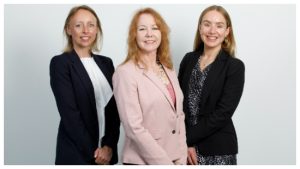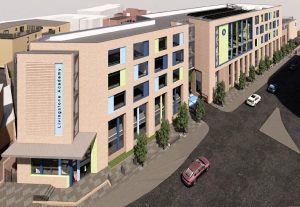Year 9 Future Ready Programme Launches
In February, five Aspirations Academies were involved in the Year 9 Future Ready Programme, delivered by Speakers...
Read more Year 9 Future Ready Programme LaunchesLivingstone Academy Bournemouth (LAB) is a pioneering school for students aged 4 to 18 for the 21st century.
The Academy was developed in partnership with Ian Livingstone CBE, co-founder of the Games Workshop, and opened in September 2021.
Our Vision is “to reinvent education through innovative teaching and deep, authentic learning to help children and young adults gain competencies and mindsets to thrive in the modern world.”
Translating our Vision into reality therefore requires identifying and defining the competencies (knowledge + skills) and mindsets which LAB students will embody and demonstrate upon graduating.
Defining our ‘portrait of a graduate’ provides students and teachers with a shared understanding of their long-term goals. As a team of educators, our job is to break down our long-term goals into learning progressions (a continuum of sequenced short-term goals) which span multiple academic disciplines and skills.
In order to provide every student with the opportunity to progress along learning progressions, we commit to creating authentic and engaging learning experiences. In the real world, work and problems do not occur within a single discipline. We look for natural links between short-term goals across multiple learning progressions and ‘bundle’ them together into connected, concept-driven experiences that mimic how we learn, think and solve problems in the real world.
Whilst the learning experience may draw on multiple disciplines, it is critical that each one provides educators at LAB with the information required to make a valid and reliable judgement as to where each student is at for each learning progression in order to inform optimal future learning experiences for that student.
The current assessment system in the United Kingdom does not support our transdisciplinary standards-based curriculum and therefore an alternative approach to assessment is required. The opportunity to participate in Rethinking Assessment’s training and pilot program was a great chance for us to learn and contribute toward the progressive work in this space in the United Kingdom.

L-R: Jen Warr, Head of Secondary at LAB, & Dr Kim Elms, Principal of LAB pictured with Nia Treharne, Director of Digital Curriculum & Innovation
Intent
As LAB is a brand new Academy, many of our staff are new to transdisciplinary and interdisciplinary design and assessment. Rethinking Assessment’s initial sessions allowed our team to connect with like-minded progressive organisations and schools in the United Kingdom and gain invaluable insights into current thinking about alternative approaches to assessment.
The capstone of Rethinking Assessment’s professional development program was the opportunity to participate in a pilot of delivering and assessing an interdisciplinary project. The brief was for schools to design, run and evaluate the impact of an interdisciplinary unit on the topic of migration.
At LAB, we apply the Understanding by Design approach to curriculum planning In order to design transdisciplinary learning experiences at LAB which align to checkpoint learning targets. Understanding by Design is a framework which helps to ensure that curriculum, assessment and instructions are aligned to the specific terminal outcomes and transferable skills by working backward from said points.
You can see the outcome of applying this approach to designing our transdisciplinary Year 7 Unit on the topic of migration in the schematic below:


Our main challenges designing LAB Game Changers were a) finding time for staff to work collaboratively within a secondary school timetable and b) engaging in interdisciplinary design within existing schemes of work. We have taken several steps to remove these barriers moving forward (see LAB: Looking Ahead).
Implementation
Launching LAB Game Changers in a way that would engage students but also allow for meaningful assessment meant hooking the students with a visit from EA Sports and an immersive experience at a migration-themed gallery whilst also running pre-assessments of students’ knowledge and skills related to the identified learning targets across the target discipline areas.
After several weeks spent developing knowledge and skills across the different disciplines, teachers discussed their evaluation of students’ progress toward the identified learning targets using relevant assessment data to purposefully construct teams that reflected students’ strengths and weaknesses.
Although the performance-based task spanned different disciplines and was a collective product, the rubric we created during the design phase ensured that students would be assessed both as a team and as an individual. We found that it was critical to achieve absolute clarity amongst the teaching on what was being assessed on an individual level vs. team level and what was being assessed in single-disciplines vs. the interdisciplinary product. Whilst this may involve more time during the design process, it is key to ensuring the exciting and innovative learning experience the student participates in still aligns to the desired outcomes.

Impact
On Tuesday 19th July, students welcomed real life “play testers” from partner primary schools in our Trust to their Exhibition of learning, as well as working professionals from a variety of gaming, creative, academic and financial industries (EA Sports, Centre VR (Virtual Reality), HSBC, Tailwind and Bournemouth University).
Whilst industry professionals were impressed by the collective product i.e. the games (which they said were of a much higher quality than they would expect from 11 and 12 year olds), teachers saw all students make significant progress toward their identified learning goals across Technology, English, Music and Science. Whilst we are not in a position to determine a causational relationship between interdisciplinary vs. traditional approaches to learning and student progress, we are confident that the high level of student engagement observed throughout the process is a major contributing factor.
LAB: Looking Ahead
As acknowledged above, we encountered several challenges and points for further investigation throughout the intent, implementation and evaluation parts of our interdisciplinary Unit. Here are some of the changes we have already made to support the development of an innovative and academically rigorous transdisciplinary curriculum.
Our focus for the year ahead is therefore two-fold. Whilst we need to develop the structures and systems which support our collaborative, interdisciplinary work, equally important is the development of the personal element of the latter. Our ability to make our Vision of a truly transdisciplinary curriculum is in part down to the extent to which we can develop our own interpersonal skills. We recognise that we, as a team of teachers, must model the collaborative and interdisciplinary structures of the collaborative and interdisciplinary workplaces we are preparing our students for. And although doing this may involve stepping out of our comfort zones, breaking down silos, and a lot of time and energy, we would strongly encourage schools across the UK to think beyond the traditional realms of assessment and explore the potential which can arise from harnessing the collective power of a teaching team.
In February, five Aspirations Academies were involved in the Year 9 Future Ready Programme, delivered by Speakers...
Read more Year 9 Future Ready Programme LaunchesThe first Aspirations Employability Diploma final of 2025 marked a significant milestone in the academic year, bringing...
Read more AAT Celebrates First Aspirations Employability Diploma Final of 2025The Diversity and Inclusion in STEM report acknowledges the lifelong benefits of STEM-related skills. It notes that opportunities...
Read more Dr Jeffery Quaye OBE: The next government must shift our anti-maths culture